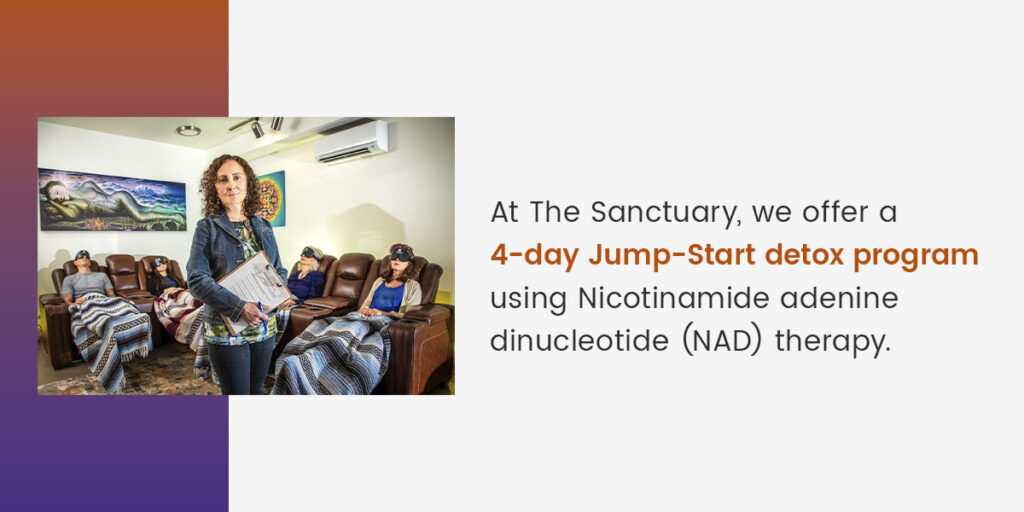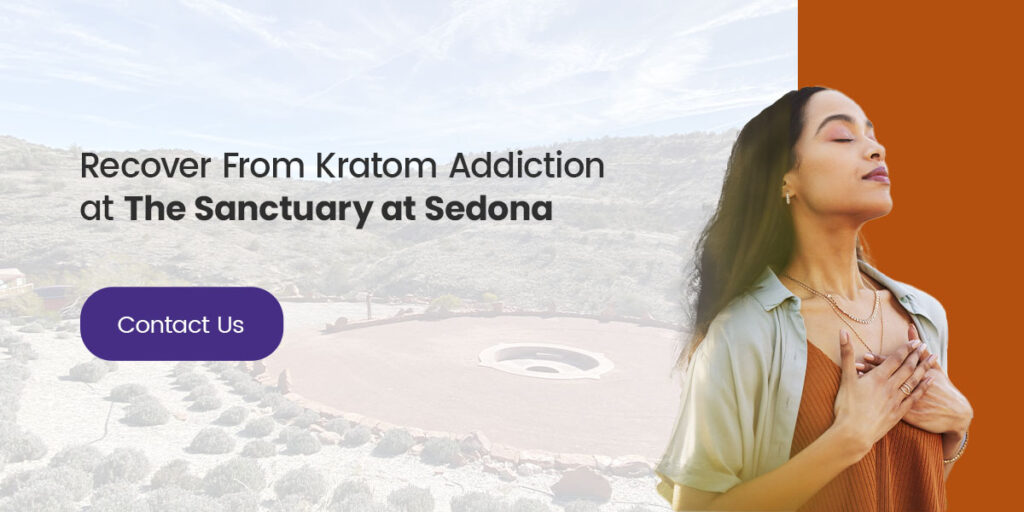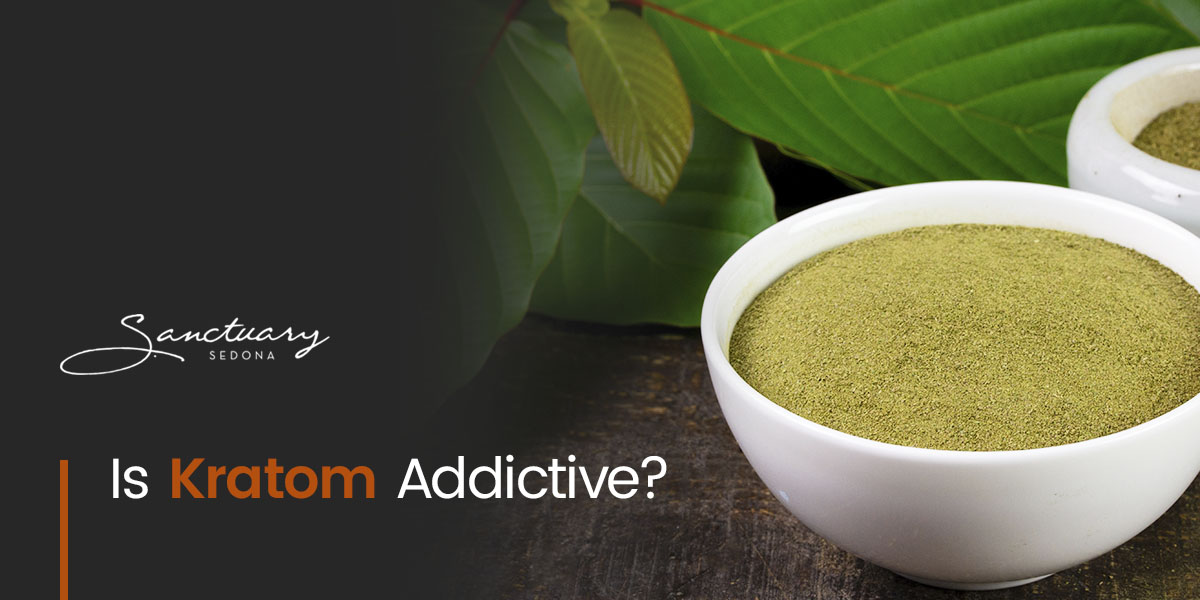Kratom, a substance that comes from an evergreen tree native to Southeast Asia, is commonly sold as a supplement to increase energy and create mild euphoria. Its use is becoming increasingly popular, especially for enhancing mood or treating minor aches and pains. Many people use it daily to cope with anxiety and stress. Kratom is marketed as safe and natural, but its effects are very similar to those of opioids. It’s also equally addictive.
Ultimately, kratom dependency can feel inescapable. But the good news is that it’s entirely possible to overcome with the right addiction treatment and support. In fact, at The Sanctuary, we believe that your healing journey can help you realize yourself in ways you never thought possible.
What Is Kratom?
Kratom is a type of tree found in Southeast Asia. Kratom leaves produce sedative and stimulant effects, and it can take various forms for consumption. Many people mistakenly believe that kratom is a safe, natural substance because it comes from a tree. However, it can negatively affect a person’s health.
How Do People Use Kratom?
Individuals can order kratom products online or purchase them from brick-and-mortar stores. Kratom leaves don’t require refinement, so people can chew them directly, smoke crushed leaves or consume them as:
- Extracts
- Capsules
- Powder
- Food additives or edible products
- Kratom tea
- Gum
Is Kratom Habit-Forming?
Kratom can be a habit-forming substance. Regular use causes a person to build a tolerance to it, meaning they gradually need to take more of the substance to feel its effects. As their body develops a kratom tolerance, an individual may increase the amount they take and use the substance more often.
Learn more about kratom, its effects, and how we can help below.
Is Kratom Addictive?
Kratom is highly addictive. The appeal of kratom comes from its ability to have psychotropic effects on the brain from its two most potent compounds, 7-a-hydroxy mitragynine and mitragynine. When taken in any form, these compounds react with the opioid receptors in the brain, causing physical and mind-altering effects such as the following:
- Nausea
- Vomiting
- Loss of appetite
- Seizures
- Confusion
- Hallucinations
- Dry mouth
- Itching
- Sweating
- Constipation
- Increased urination
- High blood pressure
- Slow breathing
- Liver complications
In severe cases, symptoms of psychosis have been reported. Like many drugs that start out as popular substances to relieve problems, an individual can quickly develop an addiction to kratom.
What Do Individuals Use Kratom for?
People often use kratom to self-treat and relieve uncomfortable physical and emotional conditions such as:
- Depression
- Anxiety
- Coughing
- Chronic pain
- Diarrhea
- Opioid withdrawal symptoms
Kratom can boost energy and invoke a feeling of euphoria, but people also report a relaxing effect similar to sedatives or opioids. People usually use products such as kratom tea and kratom supplements to chase this effect, as it numbs other feelings such as pain, depression and anxiety.
Because kratom seems to temporarily relieve opioid withdrawal symptoms, people often misuse it to recover from opioid use disorder. However, this type of self-treatment is counterproductive because it replaces one addiction with another. As people use kratom to relieve opioid withdrawal symptoms, the brain and body become addicted to the substance. Their opioid cravings may decrease, but their kratom cravings typically increase.
Is Kratom Legal?
Kratom is technically a legal substance in states that allow its use. However, the U.S. Food and Drug Administration has not approved kratom as a legal over-the-counter drug, prescription drug or dietary supplement. This lack of FDA approval means that individuals use kratom at their own risk and against the FDA’s warning. People can legally purchase and use kratom in certain states, but it is illegal for companies to misbrand kratom as a medicinal or food-grade product.
The FDA warns against kratom use because it can cause liver toxicity, substance use disorder and seizures. In some cases, kratom shows up in toxicology reports following deaths, but it remains unclear how significantly kratom contributes to these deaths. Using kratom in combination with other harmful substances increases the risk of adverse side effects or death.
The Drug Enforcement Administration (DEA) classifies Kratom as a “drug of concern.” Several countries like Denmark, France, Germany, and Ireland have banned it, making it unavailable for legal consumption. Even its countries of origin in Southeast Asia implement bans on kratom in local and regional communities. In the U.S., kratom is illegal in:
- Alabama
- Arkansas
- Illinois
- Indiana
- Tennessee
- Wisconsin
- Individual counties in states such as California and Florida
Myths About Kratom Use
Because kratom is legal to use in most states, people mistakenly believe it’s a safe substance. It’s important to understand that the following common beliefs about kratom are false:
It’s a Safe Alternative to Prescription or Over-the-Counter Drugs
Kratom is a dangerous substance that can cause adverse health effects, and it is not a safe alternative to FDA-approved drugs. Over the past five to 10 years, there’s been a significant increase in kratom usage. Manufacturers often market the substance as a holistic substitute for over-the-counter drugs. In this way, it holds major appeal for those who wish to stop their dependence on pharmaceuticals. However, just because kratom originally comes from a plant does not mean it’s safe.
“It’s like any other industry,” says a former client of The Sanctuary at Sedona. “The natural supply can’t meet the natural demand. So people are starting to put fillers like arsenic in it. I’ve seen some people buy the capsules or take the extracts and then have the worst stomach problems. They have to go to the doctor, and the doctor will put them on Suboxone, which is another opiate.”
It Can Help You Quit Using Opioids
As mentioned, many people believe kratom can treat other forms of addiction, and they use it as a way to reduce their use of other drugs like heroin or opioids.
Currently, there’s no evidence to support that kratom can successfully treat opioid addiction. Companies and individuals may promote kratom as an aid that helps people overcome withdrawal symptoms from opioids, but it can actually cause more health complications than it relieves.
Individuals experiencing opioid withdrawal symptoms often feel desperate for relief, which is why kratom has become popular despite its negative effects. It’s important to understand that kratom withdrawal is severe and causes similar symptoms as opioid withdrawal. As such, those who attempt to use kratom for this purpose often find themselves swapping one addiction for another, drawing out a painful experience. One former client speaks to this phenomenon:
“I think there are a few people out there who truly don’t realize the impact that kratom has and the danger that it poses for addiction. The majority of manufacturers and sellers who are purposefully peddling this as a safe, natural alternative to heroin and opiates. And they know exactly what they’re doing. This is highly addictive, very dangerous, and can end up in a world of hurt.”
It’s a Non-Addictive Pain Reliever
Another myth about kratom is that it can safely treat pain. But since tolerance to kratom builds so quickly, this pain relief is often short-lived. Instead, users find themselves struggling with a crippling dependency that only makes things worse.
What Symptoms Will I Have If I Stop Using Kratom?
Making the decision to stop using kratom is a very important first step. However, if you’ve developed a physical dependency, this may be difficult to achieve on your own. Kratom withdrawals can entail symptoms such as:
- Muscle aches
- Insomnia
- Extreme irritability
- Hostility
- Aggression
- Emotional changes
- Jerky movements
- Runny nose
If necessary, medically supervised detox can help you manage these symptoms and get through the withdrawal period safely before beginning inpatient addiction treatment. If you’re unsure if you’ll require professional detox, our admissions team can help you determine the best course of action for your circumstances.
How Can I Stop Using Kratom?
If you’re currently using kratom and are looking to stop, plenty of options can help guide you through the recovery process. At The Sanctuary, we know that finding the right treatment option can seem impossible — especially if you’ve tried quitting before without success. Our holistic healing journey focuses on treating all aspects of your being, rather than just surface-level issues. We don’t believe that addiction is a life sentence. Rather, we know that people can fully recover from being controlled by substances like kratom because we see our clients do so regularly. Our treatment process facilitates a deep dive into your inward journey and empowers you to redesign your life.
Holistically Healing From Addiction to Kratom
“Holistic” refers to an approach that addresses all aspects of the self. Most conventional rehabs focus on managing symptoms, but our healing approach combines cutting-edge science and alternative healing modalities for a complete, in-depth treatment experience. This approach incorporates mental, physical, emotional, and spiritual aspects of care to help you not only stop using kratom but return to wholeness. We customize treatment plans for each individual client based on a thorough assessment of their unique needs.

At The Sanctuary, we offer a 4-day Jump-Start detox program using Nicotinamide adenine dinucleotide (NAD) therapy. NAD therapy uses an active form of vitamin B3 to:
- Replenish the body
- Restore energy
- Reduce inflammation
- Repair DNA
- Improve cognitive function
- Reduce drug cravings and withdrawal symptoms
NAD therapy flushes drugs out of your system faster than a typical detox process, helping you regain and build up the energy, mental strength and physical health necessary for recovery. The Sanctuary’s 4-day Jump Start program is a pre-cursor to our 30-day program, and it pairs NAD therapy with healing modalities such as:
- Group yoga sessions
- Meditation
- Medical monitoring
- Withdrawal symptom management
- Detox smoothies
- Private bodywork
Recover From Kratom Addiction at The Sanctuary

If you’re experiencing kratom use disorder and find it challenging to end use on your own, now is a good time to reach out for help. The Sanctuary’s holistic addiction treatment program can help you heal the wounds underlying your addiction so you can not only get sober but live your best, most authentic life. Our helpful admissions team is here to answer any questions you have, connect you with resources, and help you start your journey to being well.
The Sanctuary’s holistic healing approach combines alternative and research-based treatments to help you heal physically, mentally, emotionally and spiritually. Contact us to learn more about our treatment program and how we can help you recover from substance use disorder.
Dr. Forrest is a licensed Naturopathic Physician specializing in retreat-style holistic medicine, natural detoxification and cleansing, mind/body medicine, and regenerative medicine. Dr. Forrest brings to his work a sense of humility, respect, and compassion that is too often absent in the sterile, rigid world of modern medicine. He is deeply honored and grateful to be continuing this work as part of the community and healing that is taking place at the Sanctuary. [email protected]

